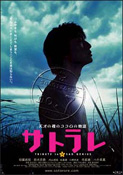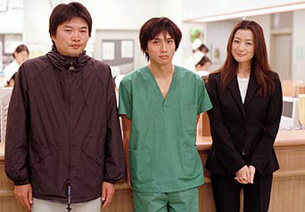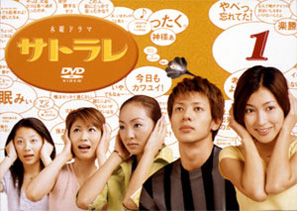Throughout the world, a doctor's profession is looked upon as one of the most respected and prominent careers in society. However, many students who strive for this dream struggle endlessly through medical school and numerous examinations to enter this field. But what if you were offered the opportunity to become a medical genius with the IQ of 195 and given the ability to transmit your innermost thoughts to people? Does it sound like a promising offer to you? Perhaps at first glance, many people would actually consider it; but after watching the Japanese foreign film, Satorare - Tribute to a Sad Genius, I'll enthusiastically pass on this offer. Although it would be nice to have a genius IQ and use it for the good of mankind, I would have to selfishly admit that my privacy is more important and I'd rather not transmit any of my thoughts to others. Even though this may seem shallow, you might agree with me once you have seen this thought-provoking film. Satorare (or roughly translated as "Transparent" in English) is a story about a young man named Kenichi Satomi (Masanobu Ando) with a goal of becoming a doctor. However, Kenichi is not your average medical student, nor your average human being for that matter. He is a genius and the seventh member of Japan's most exclusive satorare group that has the ability to transmit their innermost thoughts to anyone or anything within a ten-meter radius. Unfortunately, Kenichi does not have the ability to "pick and choose" what thoughts he wants to transmit and those around him have to listen whether they want to or not. In short, being around a satorare like Kenichi may be a bit of a problem because you may hear something you wish you hadn't. The satorare are considered Japan's most valued national treasures and are protected twenty-four hours a day without even knowing it. A special bureau in the government is responsible for following and protecting the satorare from discovering the truth about their ability. They tend to become mentally unstable and commit suicide once they realize everyone can listen in on their deepest secrets. Personalized and highly trained specialists warn the population beforehand whenever a satorare is approaching, reminding them to act natural and not to react to the satorare's broadcasted thoughts. If a person says or does anything to let the satorare know the truth about his or her ability, that person will be arrested and punished by law.
Although the storyline of Satorare is taken out of the pages of a Japanese comic book, this may not be as thrilling or action-packed as America's own comic book movie projects (such as Spiderman or Batman). Instead, it is a human drama that integrates themes such as acceptance, unconditional love, and the fragility of man. Even though the main character, Kenichi, is "blessed" with mystifying abilities, he lives a tragic life. Kenichi remains friendless because others find it awkward to hear his unspoken thoughts without showing any reaction. Also, he is denied romance because women fear the intimate details of the relationship may be indirectly revealed to the entire world. Growing up, Kenichi understood deep inside that his is different, but will never know the real reason why he is isolated by society. With his grandmother (Kaoru Yachigusa), the only person who can live with his gift, he tries to live a normal life despite others' attempt to push him away. The story of Kenichi's life tugs at the heartstrings of the audience and arouses feelings of sympathy for the protagonist. The director of the film, Katsuyuki Motohiro, mentioned in an interview at a movie-screening event that he wanted to create this movie with the idea of "entertainment through tears." Known for his directing in television drama and variety series, he wanted to incorporate a bit of comedy and warmth into the story as well. Motohiro once quoted that, "To laugh, cry, and be energized, are the three elements to an entertaining movie."
True to Motohiro's belief, Satorare is sprinkled with humorous scenes that bring warmth to the movie. Audiences will chuckle when they watch Kenichi innocently taunt a person in his mind while the person is standing within hearing range or how the staff waits for Kenichi to "think" his real opinion about the cafeteria's daily lunch special before buying it. Motohiro incorporates a nice balance of both humorous and tragic scenes to capture the audience's attention.
And what movie would not be complete without the trials and tribulations of a little romance? The heroine of the movie is Yoko Komatsu (Kyoka Suzuki), a psychiatrist and new recruit of the satorare protection agency who has been assigned to watch over Kenichi. At first she is thrilled to receive such an important duty, but later finds it more challenging than she thought it would be. Although she is a specialist, Yoko too finds it hard not to react to Kenichi's innermost thoughts, including when he thinks out loud that he has fallen in love with her. Yoko is touched by his feelings (although he has yet to voice them out loud), but questions if she only pities him from being isolated by society or is she really can love him unconditionally despite his special ability. Knowing that he longs for her affections makes Yoko feel as if she must make a decision between her job and her own personal feelings. Satorare provides a complex storyline that will touch the audience in different ways. What this movie may lack in typical Hollywood special effects or groundbreaking music makes up more than enough through its unique script. The movie is shot in a very straightforward cinematic fashion with no real special camera or graphic effects. However, Motohiro somehow brings impact to simple dialogue scenes, which are so realistic that it makes audiences really wonder if people like the satorare really exist in this world. I believe this movie has achieved its success when a movie transforms from a work of fiction to what seems to be reality. The script also presents many probing questions that most have never really considered. There may be a time in everyone's life where we wish we had the ability to read someone else's mind, but what about the opposite? How would we react if someone we know or even ourselves were a satorare? These questions are very thought provoking and make the audience think about the film even after it's long over. The cast of the movie does a fantastic job of creating a relationship with the viewers. Not one character outshines another and the acting collaboration on screen shows in the film. The performance of Masanobu Ando as the movie's hero, is nothing short but perfect. He has the ability to make audiences laugh and cry through simple facial expressions. When he feels happy, the audience shares in his joy. When he feels sad, the audience also experiences his pain. The movie's leading lady, Kyoka Suzuki, provides Ando with great onscreen chemistry. Whereas Ando's character is illustrated as innocent and somewhat oblivious to what others think of him, Suzuki portrays her character as the competent and older woman. Even though their characters may seem completely different, opposites do attract in this film.
It's been a long time since I have watched a film that was centered only on its storyline. I am used to those big Hollywood blockbusters that depend on special effects, big stars, and a heart-stopping musical score to draw a crowd. Although I know this movie may not attract everyone, it is refreshing to see a movie that can tap into all our senses and emotions as human beings. I felt somewhat satisfied after watching this movie because the storyline incorporated many different themes and genres. In Japan, Satorare has been a great success and besides already being a comic book, it has sparked a television series based on the same storyline. With all its success in it's own domestic market, I would definitely like to see it make its way to America. I think it will bring a refreshing change and give viewers a new perspective on movie viewing in general. Interested in Satorare? Order your copy today here from Akadot Retail.
|





